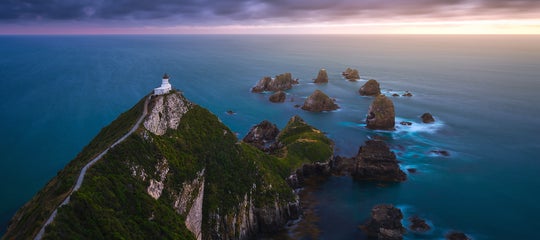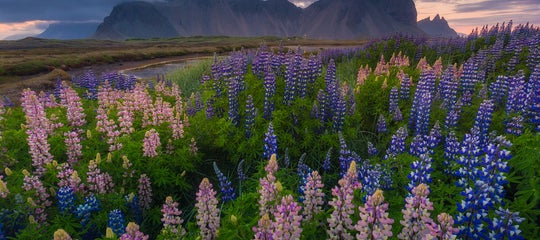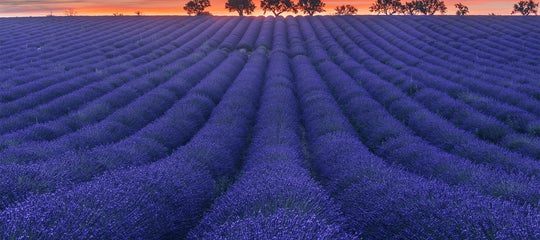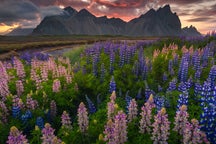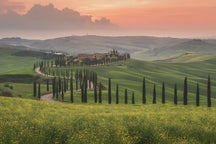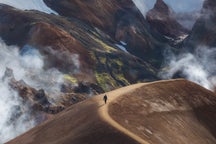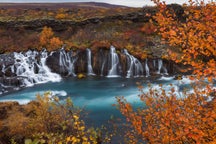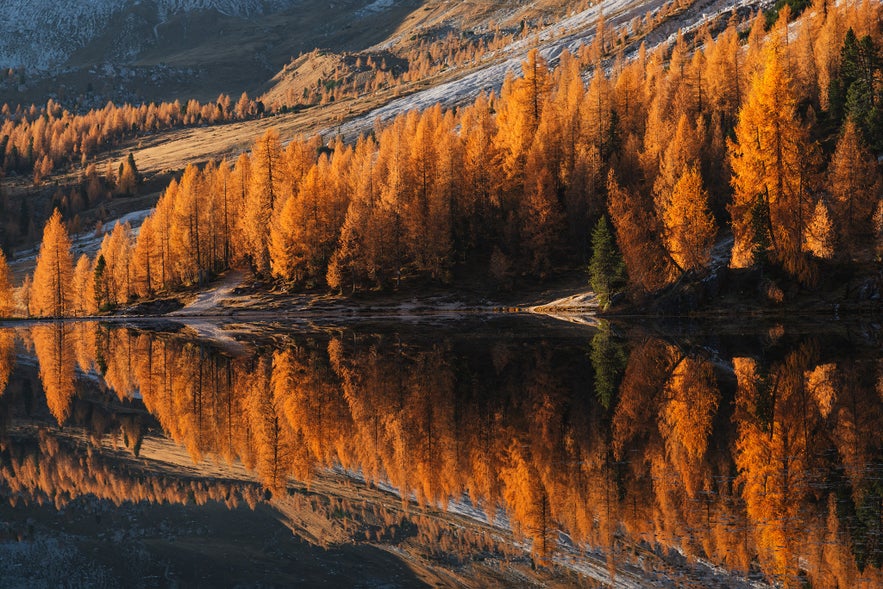
Autumn is considered by many photographers as the best season to go out and take pictures. It doesn’t take a genius to understand why. The foliage takes on a beautiful palette of earthy colours, the weather is mild and the abundance of subjects makes autumn a valid contender for the title of “Best Season of the Year” (if there were to be such a contest)!
- Check out this 6 Day Photo Tour in Slovenia | Autumn Colours & Mountain Views
- Find out all about How to Use Complementary Colours in Photography
However, the risk of falling (pun intended) into some of the most classic and popular cliches of autumn imagery is high. Consequently, so is the risk of killing your creativity by taking the same shots over and over again. In this article, I hope to give you the best advice that you can get on how to capture beautiful autumn photos, hopefully by sparking up some original ideas in your own mind!
- See also: Japan Photography Workshop in Autumn
How Do You Take Pictures in the Fall?
Well, the most logical answer would be that you take pictures the exact same way as you would during the other seasons: by clicking the shutter release button of your camera! Jokes apart, taking fall pictures will require you to pay special attention to a couple of crucial factors.
The first one is planning. Be sure to always check when the peak of foliage colours will be at the location you want to conduct your shoot. Getting the right colours in the shot represents a good 75% of the process of capturing a great autumn photo, so do your research beforehand. You can do this by looking at photo-sharing websites like Flickr or 500px.
 Photo-sharing websites can give you a good idea of when to head out for autumn colours. Photo by: 'Pixabay'.
Photo-sharing websites can give you a good idea of when to head out for autumn colours. Photo by: 'Pixabay'.
In addition to photo-sharing websites, I also use webcams and social media like Instagram a lot to do my research. By checking the shots that other photographers may have taken in the same area at a particular time of year, you can see how the colours will be before you head out for your own shoot. Webcams are an even better indicator, since they generally update every 15 minutes.
The second factor is the gear that you take out for your shoot. You won’t need super expensive stuff to photograph autumn colours but some pieces of equipment are fundamental to getting a good shot. For example, a sturdy tripod is necessary if you want to use different photography techniques, such as long exposures, HDR photography and so on. Filters can be important too, in case you want to shoot water like streams, waves and lakes.
Don’t forget that you'll need to protect your gear as well! Rainstorms are commonplace during autumn as the cold season is coming in, so be sure to have some kind of rain cover for your equipment. A weather-sealed camera will save you from lots of troubles if you happen to get caught in a storm!
Autumn Photography Ideas
Before stepping into the the biggest chapter of this article where I’ll finally give you some valuable tips for shooting autumn photos, I want to spend a couple of minutes on nice photography ideas that you can use to create interesting images. I’m putting these in a separate chapter since they are general ideas with which you can have fun experimenting.
 There is a lot that you can shoot with autumn colours! Photo by: 'Leonardo Papèra'.
There is a lot that you can shoot with autumn colours! Photo by: 'Leonardo Papèra'.
Pet Photography
Pet photography is a lot of fun during autumn! Dogs, cats, rabbits.. try to place them on a street covered with leaves. Let them play, run and pose for you: the results will be surprising to say the least! You can use a lens with a nice bokeh effect and a wide aperture to enhance the importance of your subject amongst the autumn leaves.
 Autumn is a great time for pet photography! Photo by: 'Pixabay'.
Autumn is a great time for pet photography! Photo by: 'Pixabay'.
Halloween Photography
The last time I checked, autumn is also the season for the scariest celebration of the year: Halloween! How could you miss the chance to shoot it?
 You can't go past autumn leaves and pumpkins during Halloween. Photo by: 'Pixabay'.
You can't go past autumn leaves and pumpkins during Halloween. Photo by: 'Pixabay'.
Between colourful pumpkins and tasty cakes, the photo opportunities during Halloween are endless. Try to make the most out of the celebrations by going out and about in town to shoot the city lights with scary Halloween decorations in the frame. Play with the lights and shadows. If you're out at night, then look for foggy conditions – it can help you to convey the fun and fear associated with this celebratory holiday!
Portrait Photography
Have you ever tried to photograph a model in an autumnal context? If not, you should definitely give it a go.
 Autumn leaves make for great framing in portraits. Photo by: 'Pixabay'.
Autumn leaves make for great framing in portraits. Photo by: 'Pixabay'.
By using a wide aperture and placing your subject in the right position – for example, in front of some colourful trees – you’ll be able to create a really powerful atmosphere in your images. Try to go out during overcast days and not when it's sunny, as the soft ambient light will give you more delicate contrasts. That way, you won’t have to deal with blown out highlights or shadows.
Landscape Photography
Well, last but not least, landscape photos aren’t too bad during autumn. Try to take a walk in the woods, for example. I won’t even mention the emotions or the continuous state of amazement that you'll be in for most of the time; you'll just have to experience it for yourself.
 Forests are beautiful in autumn. Photo by: 'Pixabay'.
Forests are beautiful in autumn. Photo by: 'Pixabay'.
Forests are by far the most beautiful subject to shoot during the fall season due to the splendid colours that the foliage can take. Some of the best types of trees to photograph are larches, birches and beeches, so try to visit a forest where you can find these trees!
- See also: 5 Day Autumn Photo Workshop in Iceland
11 Creative Tips for Fall Photography
Now that you've got some ideas for autumn photography under your belt, let's take a look at some creative tips that you can use to capture an array of stunning fall images!
 Fall is one of the best times for landscape photography. Photo by: 'Leonardo Papèra'.
Fall is one of the best times for landscape photography. Photo by: 'Leonardo Papèra'.
Tip #11. Hunt the Fog
No, I’m not crazy. Autumn shots with fog fit together like chocolate and cream... like peanut butter with jelly, like.. well, I think you've got the drill.
It doesn’t matter what type of photography you practice: fog will help you to enhance the autumnal mood whatever the time of day. This is because fog softens the contrasts of the scene and gives a nice depth of field. In case you are shooting portraits or wildlife, it will help you to separate the main subject from the rest of the scene.
However, it’s not just a matter of separation between subject and background. Rather, it’s the specific feeling that you can convey simply by using fog to your advantage. The result is a mix of restlessness and the unknown, which will attract the viewer and make them observe your photo more scrupulously.
Below is an example of a photo that I took during a foggy day in fall. Can you imagine the same image without the thick fog in the background?
 Fog can help you to create depth of field in your images. Photo by: 'Leonardo Papèra'.
Fog can help you to create depth of field in your images. Photo by: 'Leonardo Papèra'.
As you can see, fog helps to create depth of field. So the next time that you go outside to shoot during the fall season, try searching for foggy, spooky conditions instead of classic sunny days.
- See also: 4 Day Autumn Photo Workshop in Iceland
Tip #10. Use the Right Lenses
As a landscape photographer, I continuously find myself using wide-angle lenses during my shooting sessions. When I go out for photography in autumn though, I'll often end up shooting with a medium telephoto lens instead, such as a 70-200mm.
 Different lenses will change how you see a scene. Photo by: 'Leonardo Papèra'.
Different lenses will change how you see a scene. Photo by: 'Leonardo Papèra'.
Now, I’m not saying that you should use just a telephoto zoom and leave all of your other lenses at home. I’m just saying that according to my experience, using a longer focal length will help you to isolate your subject better and enhance the wonderful autumn colours in the scene.
Tip #9. Let Your Artistic Side Go Wild
Motion blur, artistic bokeh, in-camera double exposures... in autumn, you can really express your creative vision as you wish; the only limit is your imagination.
In the photo below, my aim was to convey the feeling of scratches upon a prison wall. I wanted it to seem as though the trees were trying to escape from the forest. By using the technique of motion blur, I was able to create this abstract image. It works because there isn't a way for your eyes to fall upon a single subject – it's just too messy for that. At the same time, the viewer still understands that they are looking at trees.
 These trees resemble scratches on a prison wall. Photo by: 'Leonardo Papèra'.
These trees resemble scratches on a prison wall. Photo by: 'Leonardo Papèra'.
You can duplicate this technique in-field by using a long exposure time. You can also try doing this in post production with software such as Adobe Photoshop. Simply select the 'Filter' menu option, then Blur → Motion Blur.
Motion blur works perfectly with colourful foliage, so the fall season is the best time to try out this technique!
- See also: 8 Day Autumn Faroe Islands Photo Tour
Tip #8. Look for Water
It doesn’t matter if it’s a tiny stream or a river, a small pond or a lake – water can always offer incredible photographic opportunities. This includes the chance to capture reflections and to practice long exposures. Best of all, water can help you to find a meaningful composition which can be difficult in the “autumn mess” of conditions.
 Water is great for capturing autumn reflections. Photo by: 'Leonardo Papèra'.
Water is great for capturing autumn reflections. Photo by: 'Leonardo Papèra'.
If you are looking for reflections, try to be at the location early in the morning. Generally, it’s one of the least windiest moments of the day. This way, you will have a better chance of capturing calm waters where your subject will perfectly reflect. Also, the soft pre-sunrise light will create a more subtle contrast, which may help you to capture the atmosphere that you want.
- See also: 6 Day Autumn Faroe Islands Photo Tour
Tip #7. Take a Walk in.. Your Garden!
Garden photography can be much more rewarding during the autumn season. The colourful backgrounds and subjects typical of the season will help you to create some stunning images, literally from your own backyard!
 A hedgehog in the garden during autumn. Photo by: 'Pixabay'.
A hedgehog in the garden during autumn. Photo by: 'Pixabay'.
Think about macro photography with mushrooms and insects. You can also try photographing birds or wildlife if you happen to live in a place that they frequent. There is a lot that you can find to photograph in your garden – you just need to look around and have a bit of patience.
For macro photography, a dedicated lens with a magnification factor of 1:1 or more is highly recommended. If you prefer to shoot wildlife, then a telephoto lens will do the job.
Tip #6. Textures are an Easy Win
Textures are always an interesting subject, whether we are talking about trees, leaves or fruit. They are even more beautiful during autumn when they take on vibrant, warm colours.
 Textures can be found anywhere, from leaves to rocks and snow. Photo by: 'Leonardo Papèra'.
Textures can be found anywhere, from leaves to rocks and snow. Photo by: 'Leonardo Papèra'.
Try a close-up shot of a falling leaf. With the right shutter speed, you can catch all of its details, which will no doubt stand out amongst the different shades. Textures are just one of nature's many marvels.
Tip #5. Use the Right Camera Settings
A lot of photographers get discouraged when they play back photos on their camera display. This is because what they see on the back of the camera often doesn't look at all like what they may have seen in reality. If this has happened to you, then have you ever wondered why?
Oftentimes, it may be because you are using the wrong camera settings. To make sure that your settings are correct, check the white balance of your camera. For autumn photography, it's recommended to set the white balance to “Shade” or “Cloudy” mode. These settings will warm up the scene the most in a way that is similar to typical autumnal foliage.
 The right camera settings will help you to achieve better autumn photography. Photo by: 'Leonardo Papèra'.
The right camera settings will help you to achieve better autumn photography. Photo by: 'Leonardo Papèra'.
In the case that you are shooting in JPEG, try switching to RAW format instead. This will give you more data to work with during post production. However, if you prefer not to do any editing, then by all means, shoot in JPEG but try to play a bit with the settings that are in-built to your camera, such as adding contrast and saturation.
These two small changes should help you achieve much better colours, directly from the moment that you capture the frame to when you see it on the camera display!
Tip #4. Take a Polariser Filter with You at all Times
It took me a while before I understood the importance of a polariser filter when shooting autumn colours. That’s because I had tried the polariser in other situations without achieving great results. Without seeing any improvement from the use of a polarising filter, I was unsure what it would add to an autumn scene.
 A polarising filter can help to enhance an autumn scene. Photo by: 'Pixabay'.
A polarising filter can help to enhance an autumn scene. Photo by: 'Pixabay'.
I decided to give my polariser one last try when I was shooting in the fall one year and I'm so glad that I did. At that moment, I regretted not having used one in the previous years!
The way that a polariser filter can enhance the colours and give you just the right amount of contrast is something that is difficult to replicate in post-processing. In addition, it can give you a much better base photo to begin with when you start editing.
If you prefer not to use any editing software, then a polariser is all the more important as it will help you to capture a much better JPEG straight out of your camera.
- See also: Patagonia Hiking Photo Adventure
Tip #3. Choose the Best Colours
Have you ever heard of complementary colours? They are basically two colours that create a strong visual contrast when placed next to one another. Red tones are complementary to blue tones, so if you include a bit of blue sky into your shots of autumn foliage, then you should be able to create a high-contrast image.
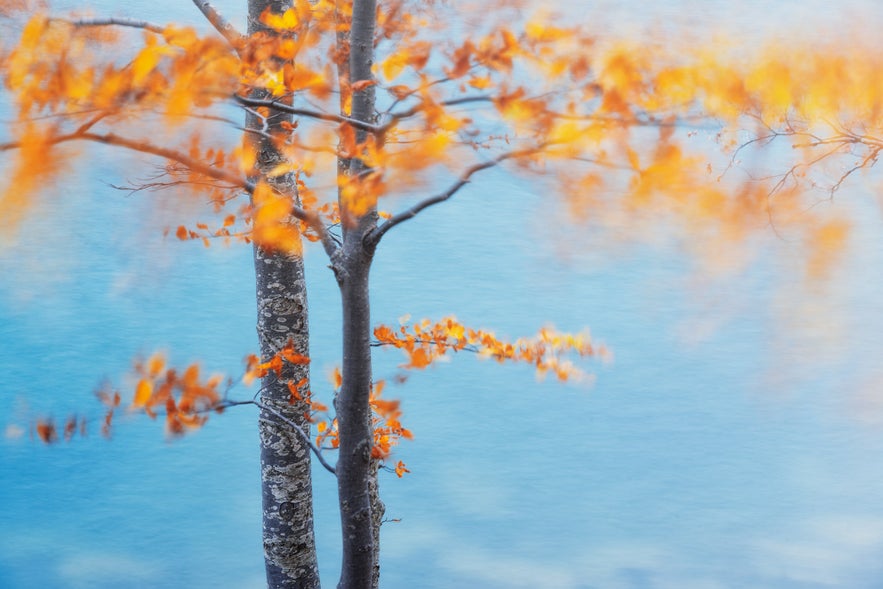 Complementary colours can enhance your images. Photo by: 'Leonardo Papèra'.
Complementary colours can enhance your images. Photo by: 'Leonardo Papèra'.
On the other hand, if you want to create a more subtle and delicate picture, you should exclude every colour that is not a variant of red, orange or yellow.
Tip #2. The Right Time for Autumn Photography
One of the main reasons that photographers are not able to achieve good results during autumn is bad timing. Believe it or not, there is a right time to go out and capture the colours of fall.
 The trick to great autumn photography is to head out at the right time of year when the colours are at their peak. Photo by: 'Pixabay'.
The trick to great autumn photography is to head out at the right time of year when the colours are at their peak. Photo by: 'Pixabay'.
For some people, it can be difficult to explain to their employer that they can't go to work because the autumn foliage is at its peak. Sometimes, the colours don't last long and it's easy for them to disappear quickly – for example, if a major storm comes in and blows all the leaves to the ground.
To make sure that you are at the right place at the right time to capture the colours of autumn, be sure to do some research beforehand. You can use webcams and local weather forecasts to help you plan your shoots.
Tip #1. Stand at the Right Elevation
There are times when whether you stand on your feet or move your camera to ground level can make all the difference between capturing a good or a bad shot. If things aren't working out for you at a certain height, then try reaching a more elevated point in order to see the bigger picture. If shooting from up high isn't successful, then try getting as low as possible to exclude certain elements or to make use of an interesting foreground.
 Changing your perspective is sometimes all you need to do to bring out the beauty of a scene. Photo by: 'Leonardo Papèra'.
Changing your perspective is sometimes all you need to do to bring out the beauty of a scene. Photo by: 'Leonardo Papèra'.
When you arrive at a location where you think there might be potential for a good shot, don’t stop looking for compositions at just one point of view. Instead, try a few different perspectives to see which one of them works best for that scene!
Conclusion
As you can see, autumn photography is one of the best times to go out and take pictures. Whenever possible, you should try to get out there as much as you possibly can. Good photos generally come from perseverance and careful planning. By being outside often, you’ll increase your chances of capturing beautiful scenery with the light that you want and at the peak of the autumn foliage.
 Get out as often as you can to capture the best colours in autumn at the right time! Photo by: 'Leonardo Papèra'.
Get out as often as you can to capture the best colours in autumn at the right time! Photo by: 'Leonardo Papèra'.
My secret is to just head outside whenever I have time. You should try to do the same!
About the author: Leonardo Papèra is a landscape photographer based in Italy. You can find more of his work on his website or by following him on Instagram.
Are you ready to start practicing new photography techniques and skills? Learn how to improve your photography on one of our Autumn Workshops in Iceland!

